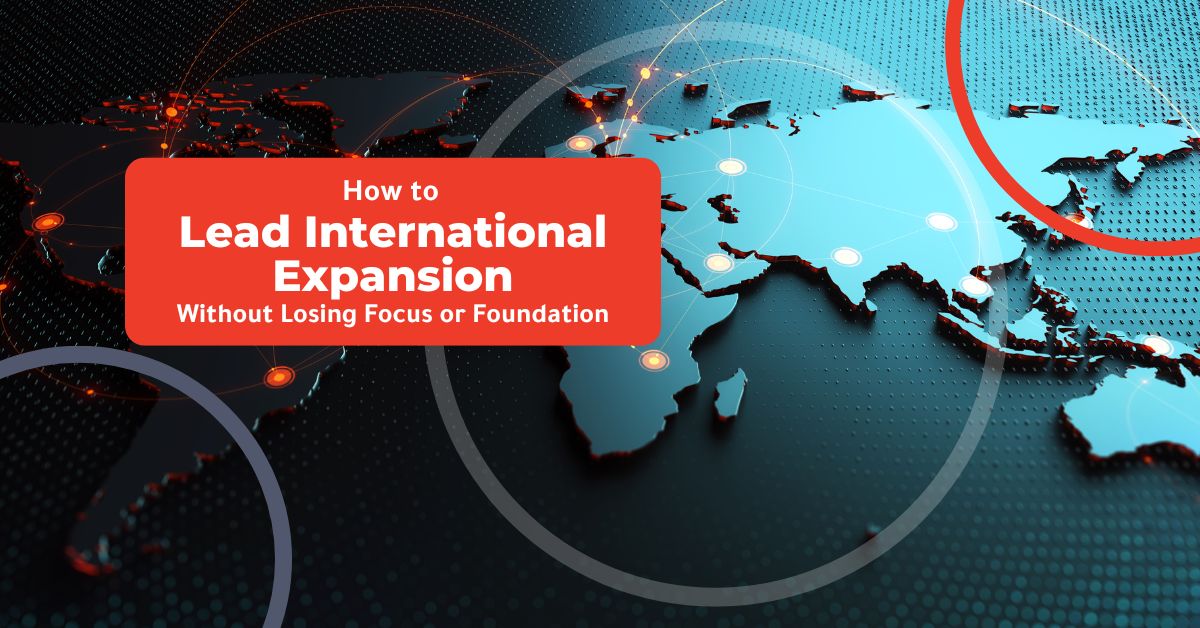How to Lead International Expansion Without Losing Focus or Footing
Oct 29, 2025
International expansion can look like progress from the outside. New markets, larger reach, greater potential. But growth across borders can introduce as many complications as it does opportunities. The challenge is not simply entering a new market. The challenge is doing so without losing the focus, structure, and culture that made your business successful in the first place.
Expanding globally tests every single system you have. Processes that work domestically may break under new regulations. Communication patterns may suffer across time zones. Cultural norms can shift the way negotiations happen, the way employees respond to management, and even the way customers interpret your brand. Successful expansion requires more than enthusiasm and a willingness to take risks. It requires financial discipline, cultural awareness, and strategic patience.
The CFO’s Role in Global Growth
A CFO is often the first to see whether international expansion is a real opportunity or a costly distraction. The right CFO can even recognize an opportunity where others might interpret a threat. The numbers tell part of the story, but financial readiness also requires an ability to understand the cost structure, the cash cycle, and the return expectations in a completely different context.
A strong CFO evaluates:
- The cost of compliance with local tax, labor, and reporting laws.
- Currency risk and how to hedge against it.
- The pace at which revenue will realistically ramp up compared to expenses.
- How new operations fit into the company’s existing financial systems.
These considerations help prevent surprises that derail otherwise sound strategies. The right CFO asks hard questions before commitments are made. What happens if political conditions shift? What if a key supplier fails to deliver? What if cultural differences create unexpected turnover? In international business, every “what if” has a price tag attached.
Culture as a Strategic Asset
Culture often becomes an afterthought in expansion plans, but it may be the most important determinant of long-term success. What motivates employees in one country may not motivate those in another. Expectations around hierarchy, communication, and accountability differ widely.
For instance, while in the US it’s common for employees to voice opinions openly, in parts of Asia or the Middle East that same directness can be seen as disrespectful to senior leaders. In some European countries, casual conversation with executives is normal; elsewhere, hierarchy shapes every interaction.
Executives who underestimate this risk alienating the teams they are trying to build. A company that enters a new market with a one-size-fits-all mindset risks appearing disconnected or arrogant.
The most successful leaders treat culture as a strategic asset. They adapt without abandoning their core values. They maintain a clear sense of what defines their organization but express it in ways that resonate locally. Culture should be flexible enough to translate across borders, yet strong enough to remain recognizable.
Building the Right Local Partnerships
Even experienced executives can underestimate how critical local relationships are. A reliable local partner can help navigate regulations, understand business etiquette, and interpret market behavior. Think about it – right now, if tasked with some logistical, legal, banking or leadership task you probably have somebody in mind to ask or involve. When you expand internationally, you might have to build some of those relationships from scratch.
The CFO’s insight matters here as well. The right partnerships should not only make operational sense but also align financially and ethically. The wrong partnership can create hidden liabilities, particularly in countries where corruption, inconsistent enforcement, or opaque practices are common.
Vetting partners means understanding ownership structures, verifying compliance records, and ensuring your brand will not be compromised by association.
Managing Risk Without Losing Momentum
Risk is unavoidable in international growth. The goal is not to eliminate it but to manage it deliberately. Strong CFOs lead this process by quantifying risk and creating contingency plans.
For example, exchange-rate volatility can be modeled. Scenario planning can prepare for market downturns or supply-chain disruptions. A robust risk framework allows leadership to move forward with confidence, not hesitation.
But risk management should never become risk avoidance. Companies that wait for perfect conditions rarely expand successfully. The right approach is to move forward with measured confidence, understanding what you can control and preparing for what you cannot.
Communication Across Borders
Communication becomes both harder and more important during international expansion. Misunderstandings are amplified by distance and language. A clear communication plan, internal and external, is critical.
Executives should:
- Maintain visibility with new teams and markets through consistent updates.
- Use communication tools that support multiple time zones and languages.
- Reinforce company values and expectations in ways that resonate culturally.
Internally, communication keeps teams aligned and focused. Externally, it builds credibility with partners, customers, and regulators. Consistent messaging helps new markets understand who you are and what you stand for.
Keeping Strategy Aligned
Global growth can pull an organization’s attention in too many directions. Leaders can become reactive, responding to daily challenges rather than steering toward long-term objectives. The CFO’s presence is essential here as well, not only as a financial steward but as a guardian of focus.
Be careful, too, that expansion doesn’t dilute your identity or priorities. Every new opportunity should be evaluated against a clear framework: Does this serve our strategic direction? Can we support it financially without jeopardizing stability elsewhere? Will it make us stronger five years from now, or just busier next quarter?
A Framework for Sustainable Expansion
Sustainable international growth depends on discipline in five areas:
- Preparation. Conduct detailed market research and financial modeling before committing resources.
- Partnerships. Build local relationships that add knowledge and credibility.
- Culture. Protect your company’s core values while respecting local norms.
- Financial Systems. Integrate new operations into your existing reporting and cash management structures early.
- Communication. Keep leadership aligned and teams informed at every stage.
When these elements work together, expansion becomes less about risk and more about readiness.
Focus and Footing
International expansion will always involve uncertainty. Markets change, governments shift, currencies fluctuate, and cultures surprise. But companies that expand with focus and footing, knowing who they are and how they operate, can turn uncertainty into strategic advantage.
The CFO’s role is to balance ambition with discipline, to keep strategy tied to numbers, and to make sure the excitement of new opportunity doesn’t overshadow the fundamentals that built the business.
Growth across borders is possible for any company willing to prepare deeply, communicate clearly, and lead with both financial intelligence and cultural respect. That balance is what keeps organizations steady when the ground beneath them starts to shift.


